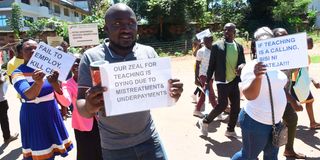Education in paralysis as JSS teachers keep off classrooms

Junior Secondary School teachers protest in the streets of Kakamega town on Tuesday last week, demanding better terms of employment for interns.
Learning in Grades Seven and Eight in thousands of public schools has been paralysed as the boycott by intern teachers enters its second week.
Junior secondary school (JSS) learners have been idling in classrooms as there is no one to teach them. A staffing shortage that has hit JSS since its roll-out last year has exacerbated the crisis.
The stalemate between the interns and the Teachers Service Commission (TSC) entered its second week on Monday this week, even as learning in private schools went on unabated.
Teachers have engaged in protests across the country, agitating for their employment on permanent and pensionable terms and citing last month’s ruling in their favour by the Employment and Labour Relations Court.
Recruiting teachers
The government started recruiting teachers on one-year contracts in 2019 under the controversial programme. There are 46,000 such teachers, majority of whom are deployed to JSS, which consists of Grades Seven, Eight and Nine. Grade Nine will be rolled out in January.
“Interns are the cornerstone of JSS. The situation is dire and requires intervention. It’s no longer a labour but education issue,” Kenya Union of Post Primary Education Teachers (Kuppet) Secretary-General Akello Misori said.
The union last week petitioned the TSC, the National Assembly Committee on Labour, and the National Treasury to resolve the impasse. However, Mr Misori said the union has not received a response on the matter.
At AIC Visa Oshwal Primary School in Kabarnet, Baringo County, the six teachers on contract did not report back when schools reopened last week. The headteacher, Mr William Bowen, said the school has been forced to hire four trainees who are on teaching practice to teach the 386 JSS learners.
The headteacher of Kilifi Primary School in Kilifi County, Mr Emmanuel Karuke, said teachers hired by the board of management are attending to the learners together with trainees on teaching practice. The school has 168 students in Grade Seven and 186 in Grade Eight.
In the neighbouring Seguton Primary School in Kabarnet, the two teachers on contract are yet to report back to work. The institution has 80 JSS learners and only one teacher on permanent and pensionable terms.
“To avoid the learners idling the whole day, primary school teachers have been forced to help the one teacher,” said the headteacher, Mr Jonathan Chebet.
North Rift region
Across the North Rift region, most non-local teachers have yet to travel back from the holidays.
“We facing intimidation from senior TSC officers who have influenced police officers not to acknowledge our notification to stage peaceful processions,” a teacher in Turkana County told the Nation but asked not to be named.
On Tuesday, some JSS teachers held demonstrations in Kitale, Trans Nzoia County, vowing not to return to work until their demands are met.
The headteacher of Kitale School, Mr David Luganda, said learning was not interrupted and all teachers are on duty.
“I have nine teachers in our JSS section and all have been on duty since we reopened. Four of them are interns,” said Mr Luganda.
Trans Nzoia Parents Association chairperson Wellington Waliaula expressed his concerns, saying, “the government must act on this matter because children are not learning.”
During their demonstrations yesterday, the JSS teachers dismissed a statement made by National Assembly Education Committee chair Julius Melly urging them to resume work on the promise that 26,000 of them will be employed on permanent and pensionable terms in January.
“We will only end our strike once we receive a formal communication from the TSC about changing the employment terms for 46,000 teachers, not from politicians,” Mr Walter Wanjala, who spoke on behalf of the group, said. There were also demonstrations in Kapenguria town on Monday.
At Basi Primary School in Kilifi County, only one JSS teacher, who is employed on permanent terms, was present in the school on Monday. A teacher in Rabai told the Nation that the few permanent teachers posted to JSS are overworked.
Permanent terms
"Some schools have one teacher on permanent terms and it becomes difficult to control all the learners," said the teacher.
Speaking to the Nation, Kuppet Kilifi branch vice executive secretary Zacharia Opollo said headteachers were frustrated.
“The truth is that there is no learning this term and it has never been there. We are wasting a whole generation. Headteachers are struggling to look for university students to teach in their schools,” he said.
In the 2024-2025 budget proposals, the TSC has been allocated Sh8.3 billion to employ 26,000 contract teachers on permanent basis in January 2025. Most of these teachers are deployed in JSS and will have served for two years by the end of the year.
Of the total figure, 4,000 will are primary school teachers and the other 22,000 are in secondary schools. However, the new plan will leave out 20,000 others who will have not have served for two years, as required by the TSC.
TSC has been allocated Sh4.68 billion to hire 20,000 more teachers on contract. This would bring to 76,000 the total number of teachers recruited by the Kenya Kwanza government, whose manifesto promised to bridge the shortage of 116,000 teachers by employing 58,000 more at a cost of Sh25 billion per year. If such funds were to be allocated for the purpose, all the teachers would be hired on permanent and pensionable terms.
Reporting by David Muchunguh, Florah Koech, Sammy Lutta, Evans Jaola, Oscar Kakai, and Maureen Ongala





